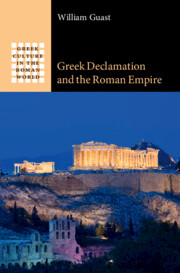Book contents
- Greek Declamation and the Roman Empire
- Greek Culture in the Roman World
- Greek Declamation and the Roman Empire
- Copyright page
- Dedication
- Contents
- Preface
- Abbreviations
- Introduction
- Chapter 1 Exempla and Exemplarity
- Chapter 2 Declamation, Life, and the Imagination
- Chapter 3 Text and Performance Context
- Chapter 4 Identity Parade
- Chapter 5 Macedon
- Chapter 6 Strife and Concord
- Conclusion
- Book part
- References
- Index
Conclusion
Leptines Once More
Published online by Cambridge University Press: 22 June 2023
- Greek Declamation and the Roman Empire
- Greek Culture in the Roman World
- Greek Declamation and the Roman Empire
- Copyright page
- Dedication
- Contents
- Preface
- Abbreviations
- Introduction
- Chapter 1 Exempla and Exemplarity
- Chapter 2 Declamation, Life, and the Imagination
- Chapter 3 Text and Performance Context
- Chapter 4 Identity Parade
- Chapter 5 Macedon
- Chapter 6 Strife and Concord
- Conclusion
- Book part
- References
- Index
Summary
Certain oddities and omissions in two pseudo-Aristidean declamations on Leptines' proposal to abolish exemptions from liturgies are explained with reference to their composition in thirteenth-century Byzantium: their author, Thomas Magistros, seems to be alluding to contemporary debates about the pronoia, a Byzantine tax exemption. But the same scenario was also being performed as early as the third century BCE, for which period it has also been argued to be relevant. Further examples of declamations covering topics of importance to their own time are considered from the Hellenistic era to Late Antiquity and Byzantium and even the English reniassance. That Greek imperial declamation too should speak to the times in which it was written ought not therefore to be surprising. Declamation's ability to do so depends on a careful balance. There is much in its scenarios that seems of relevance to any age, and moral foundations theory helps us put such intuitions on a firmer footing. But it is equally important that the world of declamation is not our own. As a result, issues are approached obliquely, declaimers are safer, audiences are more receptive, and the resulting interpretations themselves are more diverse.
- Type
- Chapter
- Information
- Greek Declamation and the Roman Empire , pp. 180 - 188Publisher: Cambridge University PressPrint publication year: 2023

